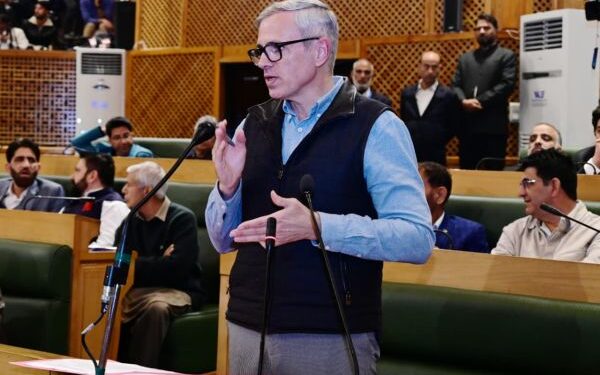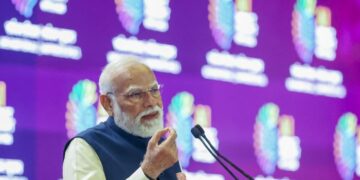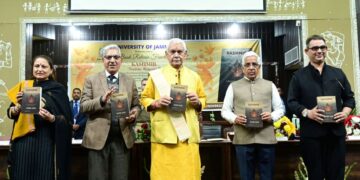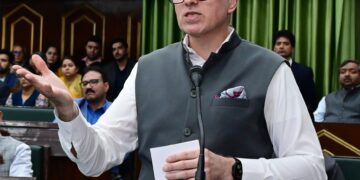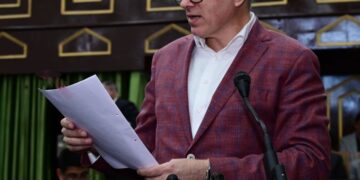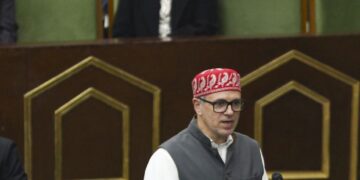Srinagar: The Jammu and Kashmir Assembly on Tuesday rejected a private member’s bill seeking to recognise the proprietary rights of houses constructed on government land illegally, with Chief Minister Omar Abdullah saying such a bill would open floodgates for land grab.
The Bill was moved by PDP MLA from Pulwama, Waheed Para.
“How can we pass a bill that helps the land mafia and illegal encroachers? In which, it cannot be said whether they are citizens of Jammu and Kashmir or have they come here recently and built houses, but we have to give them land,” Abdullah told reporters on the sidelines of a function here.
He was responding to a question on his government not supporting the private member’s bill brought by the People’s Democratic Party (PDP) MLA for providing proprietary rights to those who have built houses on government land.
“The bill that has only been brought for politics will harm the people of Jammu and Kashmir and I will not let the people of Jammu and Kashmir be harmed through my government,” the National Conference (NC) leader said.
He said the NC government will have no objection to any bill that is beneficial for the people of Jammu and Kashmir, “but we cannot pass a bill which will help the land mafia”.
Asked about the PDP supporting the NC in the Rajya Sabha polls in lieu of support to the bill, the chief minister said he is not ready to “sell” Jammu and Kashmir for a seat in the Upper House of Parliament.
“What does that mean, should I sell Jammu and Kashmir? I am not ready to sell Jammu and Kashmir’s land for a Rajya Sabha seat. I have said, bring a bill that benefits the people of Jammu and Kashmir. If you get a bill to help the land mafia, then, at least, it will not be passed through our hands,” he added.
The PDP had supported the NC in the recent Rajya Sabha polls on the condition of the government supporting the private member’s bills submitted by the opposition party on granting land rights and regularisation of daily wagers.
Earlier in the day, the Assembly rejected the private member’s bill seeking to recognise the proprietary rights of houses constructed on government land illegally, with the chief minister saying such a legislation would open the floodgates for land grab.
“A bill to provide special provisions for residents of Union Territory of Jammu and Kashmir for recognising the proprietary rights of houses constructed on State land, Kacharia land, Common land and Shamilat land (section 4 of Jammu and Kashmir Agrarian Reforms Act, 1976), by securing the rights of ownership or transfer in favour of the residents of such residential house owners, who are in possession of such land, in the interest of right to shelter as guaranteed by Article 21 of the Constitution of India and for the matters connected therewith or incidental thereto,” the bill said.
However, the government opposed the bill and requested Para to withdraw it.
In a heated exchange, Chief Minister Abdullah dismissed the proposal, drawing parallels to the highly controversial and eventually defunct ‘Roshni’ scheme and recalled that the original 2002 Roshni scheme, initiated under his father’s government, aimed to convert leasehold rights into freehold rights for people who had legal possession of land before the start of militancy.
The revenue generated was intended for power generation projects, he said.
The chief minister noted that the subsequent PDP-Congress government under Ghulam Nabi Azad removed the pre-militancy cutoff date, leading to controversies, including allegations of ‘land jihad’, and the scheme’s eventual rejection by the court, where the government “could not defend” it.
Abdullah stressed that the current bill goes far beyond Roshni, seeking to legalise illegal occupation of state land, not merely regularise existing legal leaseholds.
“This proposal of the MLA is beyond the Roshni scheme. The bill does not put a cutoff timeline,” he said, adding “if this is passed, then I will go tomorrow and build a nice house on a piece of land, and that land will be in my name. We cannot do that.”
Countering the argument by Para about the senior Abdullah and that the government’s stance was politically motivated or driven by fear of groups who used terms like ‘land jihad’, the chief minister sought the legacy of his grandfather, Sheikh Abdullah, and the historic ‘Land to the Tiller’ reforms, stating, “Land to Tiller (law implemented by senior Abdullah) was giving rights to tillers, not land grabbers”.
“There is a huge difference between land to tiller and what you are proposing,” he added.
The chief minister also clarified that the government is committed to providing housing for the landless through existing programs like the Pradhan Mantri Awas Yojana (PMAY), under which government land is allotted for house construction.
He maintained, however, that the government cannot reward illegal occupation.
“We will give them five acres of land. Those who do not have a house, we will give them. But then you connect it with the fact that the one who is sitting illegally on the land… I will give him free land. We will not do that.”
Talking about the fear factor as mentioned by Para while pointing towards the BJP benches, Omar hit back saying “you (Para) said somewhere that we work because of their fear. If we had to work because of their fear, then we would have brought them to this side (Treasury bench) and worked together.”
The chief minister made it clear that it was the PDP which was bringing in the BJP and religion into discussion on his bill. “I did not use that thing to reject this bill. I said that you will open a floodgate,” he added.
Referring to Para’s remarks that the bill would also benefit the chief minister’s relatives, he said, “My relatives were not illegal occupants, they had a lease which was violated (by the other side)”.
“I would not bring such a bill even for my relatives. Then you bring religion and region into it,” he said, opposing the introduction of the bill.
After Para refused to withdraw the bill, Speaker Abdul Rahim Rather put it to vote, but it received the support of only two members. The bill was defeated by the voice vote. (With PTI Inputs)

